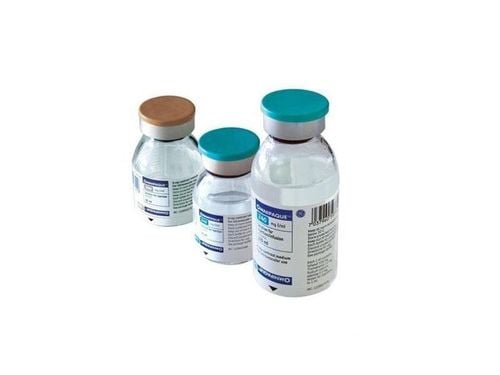This article is professionally consulted by Nguyen Thuc Vy, MSc, MD – Radiologist, Department of Diagnostic Imaging, Vinmec Nha Trang International Hospital
Iodine-containing contrast agents are commonly used before performing certain diagnostic imaging techniques, such as X-ray or CT scans. These contrast agents function by enhancing the contrast of body structures and fluids during imaging, resulting in clearer and more detailed images, which facilitate accurate diagnosis by doctor.
1. Why are Iodine-containing contrast agents essential?
During CT imaging, dense structures like bones are easily distinguishable, whereas soft tissues appear less defined. To improve the visualization for doctor, patients are administered a special dye called contrast agent. These substances absorb X-rays and appear bright white on scans, effectively highlighting blood vessels, organs, and other anatomical structures.
Contrast agents are primarily composed of iodine or barium sulfate.They can be introduced into the body through several methods:
- Injection: The contrast agent is directly injected into a vein, commonly used for imaging blood vessels, the urinary system, the liver, or the gallbladder.
- Oral administration: The patient ingests a contrast-containing liquid, which enhances visualization of the digestive tract.
- Rectal administration (Enema): This method is utilized when detailed imaging of the rectum and lower intestines is required.

Following a CT scan with contrast, patients are advised to increase fluid intake to help the kidneys efficiently clear the contrast agent from the body, minimizing any potential renal burden.
2. Side effects of Iodine-containing contrast agents
Some possible side effects associated with iodine-based contrast agents include:
- Diarrhea, nausea, vomiting, stomach pain, bloating, or headaches may occur after administration. If any of these symptoms persist or worsen, patients should inform the doctor or pharmacist as soon as possible. It is important to note that contrast agents are prescribed because the doctor has judged that diagnostic benefits outweigh potential side effects. Most individuals receive iodine-containing contrast agents without experiencing serious adverse reactions.
- Patients should immediately notify their doctor if they experience symptoms of renal impairment, such as decreased urine output or anuria following contrast agent administration.
- Allergic reactions to Iodine-containing contrast agents: Hypersensitivity reactions to iodine-based contrast agents can range from mild, such as itching and skin rash, to severe, such as anaphylactic shock, which is life-threatening. This severe allergic reactions are extremely rare so that they require immediate medical attention. Patients should seek urgent medical care if they experience any of the following symptoms: skin rash, itching or swelling (particularly around the face, tongue, throat), severe dizziness, difficulty breathing.

3. How to prevent side effects of Iodine-containing contrast agents?
Before receiving an iodine-based contrast agent, patients should inform their doctor or pharmacist if they have history of allergies to iodine-containing contrast agents or any other known allergies. Additionally, some contrast agents may contain inactive ingredients that could trigger allergic reactions or other complications. Therefore, detailed consultation with a doctor or pharmacist is necessary before administration.
Before using an iodine-containing contrast agent, patients should discuss their medical history with their doctor or pharmacist, especially if they have: asthma, a history of medication or food allergies, kidney diseases.
Prior to undergoing surgical procedures, patients should inform their doctor or dentist about all medications they are currently using (including prescription medications, over-the-counter medications, herbal supplements)
Patients with diabetes should notify their doctor about their current medications because in certain cases, diabetic patients may need to discontinue metformin for 48 hours before and after contrast-enhanced imaging to prevent potential complications.
During pregnancy, iodine-based contrast agents should only be administered when absolutely necessary. Therefore, expectant mothers should thoroughly discuss the potential risks and benefits of contrast agent use with their doctor before proceeding with the imaging procedure.

Vinmec International General Hospital, equipped with state-of-the-art medical facilities and advanced diagnostic technologies, along with a team of highly experienced specialists and neurologists, provides comprehensive and expert care for patients with intracranial hypertension. Patients can have full confidence in receiving accurate diagnosis and effective treatment for intracranial pressure disorders at Vinmec.
To arrange an appointment, please call HOTLINE or make your reservation directly HERE. You may also download the MyVinmec app to schedule appointments faster and manage your reservations more conveniently.
To arrange an appointment, please call HOTLINE or make your reservation directly HERE. You may also download the MyVinmec app to schedule appointments faster and manage your reservations more conveniently.





